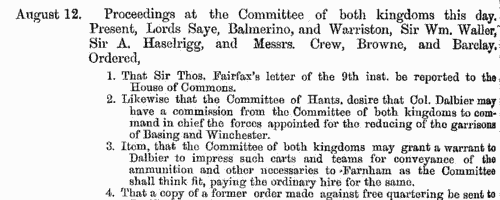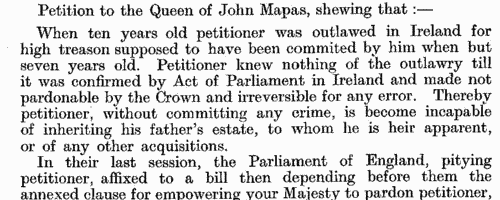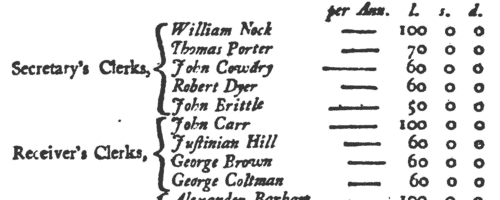Haslerigg Surname Ancestry ResultsOur indexes 1000-1999 include entries for the spelling 'haslerigg'. In the period you have requested, we have the following 9 records (displaying 1 to 9): Buy all | | | Get all 9 records to view, to save and print for £36.00 |
These sample scans are from the original record. You will get scans of the full pages or articles where the surname you searched for has been found. Your web browser may prevent the sample windows from opening; in this case please change your browser settings to allow pop-up windows from this site. Middlesex Sessions
(1549-1603)
This printed calendar collates a number of surviving records from Middlesex sessions for the period. Principally these are the Gaol Delivery Rolls (G. D. R.) and the General Sessions of the Peace Rolls (G. S. O. P. R.). Both series cover general criminal indictments (bills) together with the recognizances of the witnesses to attend; but the Gaol Delivery Rolls, by their very nature, tend to deal with the more serious cases - felonies where the accused could not be released on bail. The General Sessions rolls also include the sheriff's lists of bailiffs, sub-bailiffs, high and petty constables in the shire; writs of venire facias for production of jurors, writs of capias, lists of jurors, jury-panels &c. The Gaol Delivery Rolls also include coroners' inquests, writs of supersedeas, and memoranda of proclamations. Special inquiries are recorded in separate Sessions of Oyer and Terminer (S. O. T.) rolls and Inquest or Inquisition rolls (I. R.) Although coverage is good, none of the sequences of rolls for this period is complete. A peculiarity of this calendar is that in the case of actual incidents, the date given at the start of each entry is the date that the incident was alleged to have taken place (for instance, 1 June 11 Elizabeth (1569) in the sample scan) rather than the date of the court proceedings. HASLERIGG. Cost: £4.00.  | Sample scan, click to enlarge

| Official Papers
(1645-1647)
The State Papers Domestic are the main series of records of internal British administration for this period. The volumes printed in abstract here (Charles I dx to dxv) run from July 1645 to December 1647, a period of defeat of royal power by the parliamentary forces. Parliament's victory at Naseby in June 1645 led to the collapse of the Royalist cause and the imprisonment of the king in Carisbrooke Castle towards the close of 1647. During all these events the administration of government continued, largely using the same institutions, leaving similar series of records as before: but executive power is now represented in these books by the Committee of Both Kingdoms (England and Scotland). The State Papers Domestic for these years are largely concerned with the prosecution of hostilities, the movements and supply of troops, and the treatment of 'delinquents'. Chronologically interleaved with the abstracts of the main volumes are details from the series of Proceedings of the Committee of Both Kingdoms, but these are lost for the years 1646 to 1647, brief notes only surviving in the Indexes to the Day Book of Orders. There are also appendices relating to the victualling and disposition of the Navy, taken from the Letters and Papers of the Committee for the Admiralty and the Committe of the Navy, which also include some petitions from sailors, victuallers, officials, or their dependants, seeking redress or relief.HASLERIGG. Cost: £4.00.  | Sample scan, click to enlarge

| PCC Probate Abstracts
(1650-1651)
The Prerogative Court of Canterbury's main jurisdiction was central and southern England and Wales, as well as over sailors &c dying abroad: these brief abstracts usually give address, date of probate and name of executor or administrator
HASLERIGG. Cost: £2.00.  | Sample scan, click to enlarge

| London Marriage Allegations
(1611-1660)
London, Essex and part of Hertfordshire lay within the diocese of London. In the later 17th century the individual archdeaconry courts issued marriage licences, but for this period the only surviving material is from the overarching London Consistory court. The main series of marriage allegations from the consistory court was extracted by Colonel Joseph Lemuel Chester, and the text was edited by George J. Armytage and published by the Harleian Society in 1887. A typical later entry will give date; name, address and occupation of groom; name, address and condition of his intended bride, and/or, where she is a spinster, her father's name, address and occupation. Lastly we have the name of the church where the wedding was going to take place. For the later years Colonel Chester merely picked out items that he thought were of interest, and his selections continue as late as 1828, but the bulk of the licences abstracted here are from the 17th century.HASLERIGG. Cost: £4.00.  | Sample scan, click to enlarge

| Royalist delinquents in county Durham and Northumberland, their successors, tenants, debtors and creditors
(1648-1660)
King Charles I was executed 30 January 1649, the kingship was abolished and government by a Council of State was established 14 February 1649. Oliver Cromwell became Lord Protector 16 December 1653; died 3 September 1658; and was succeeded by his son Richard, who abdicated 24 May 1659. Charles II was established on the throne 29 May 1660. From 1648 to 1660 parliament sequestrated royalists' estates, restoring many by a process of heavy fines called compounding; this was administered by the Committee for Compounding, working through county committees. These raised considerable amounts of money, money which was vitally necessary for maintaining the parliamentary army's campaigns to subdue opposition in the three kingdoms - England, Scotland and Ireland. The raising and delivery of these monies was the responsibility of the Committee for Advance of Money (C. A. M.). The records of these committees were detailed and extensive, amounting to about 300 volumes, and were calendared for the Public Record Office by Mary Anne Everett Green. Abstracts of the county Durham and Northumberland entries were collated by Richard Welford with a manuscript transcript of the proceedings of the parliamentary commissioners in county Durham surviving in Durham cathedral library, and published by the Surtees Society in 1905. The persons named in these abstracts are not only the delinquents themselves, and those who succeeded them in their estates, but tenants, debtors and creditors, and local constables and officials of the committees.HASLERIGG. Cost: £4.00.  | Sample scan, click to enlarge

| State Papers Domestic
(1683)
The State Papers Domestic cover all manner of business relating to Britain, Ireland and the colonies, conducted in the office of the Secretary of State, as well as other miscellaneous records. This calendar of the records from 1 January to 30 June 1683 was prepared by F H Blackburne Daniell, and published in 1933. It covers material from State Papers Domestic, Charles II, 359, 422-426; Various 9 and 12; Entry Books 50, 53-57, 63, 66, 68-69, 164, 335; Signet Office 1 vol II; King William's Chest 3; State Papers Scotland Warrant Books 7 and 8; State Papers Ireland 341, 343 and Entry Book 1; State Papers Channel Islands 1; and Admiralty 77 (Greenwich Hospital, Newsletters, Original), 2.
HASLERIGG. Cost: £4.00.  | Sample scan, click to enlarge

| State Papers Domestic
(1702-1703)
The State Papers Domestic cover all manner of business relating to Britain, Ireland and the colonies, conducted in the office of the Secretary of State, as well as other miscellaneous records. 1 March 1702 to 31 May 1703. The calendar was prepared by Robert Pentland Mahaffy, with certain classes of document extracted and placed in separate appendices (called Tables): I, caveats; II, church and university appointments, &c.; III, commissions, warrants for commissions, notes of commissions and notes of warrants for commissions in the English army for 1702; IV, lord lieutenants and deputy lieutenants; V, Irish warrants; VI, weekly lists of ships of the Home Fleet with their stations and orders; VII, passes, notes of passes, post warrants and licences of absence; VIII, orders on petitions; IX, Scottish warrants and commissions; and X, miscellaneous royal warrants (to the Attorney or Solicitor General; in criminal cases; diplomatic; military warrants; miscellaneous warrants; secretary's warrants, allowance of bills, &c.; and notes of warrants for the appointment of almsmen). The source material in the Public Record Office that he drew on in making this compilation is referenced throughout, and is from the State Papers Domestic (and Military, Naval, Signet Office, Various, and Letter Books and Entry Books), State Papers Scotland (Correspondence, Letter Books and Warrants), State Papers Ireland (and King's Letter Books), and State Papers Channel Islands.
HASLERIGG. Cost: £4.00.  | Sample scan, click to enlarge

| The Royal Household
(1741)
'A General List, or Catalogue, Of all the Offices and Officers Employ'd In the several Branches of his Majesty's Government Ecclesiastical, Civil, Military, &c. In South-Britain, or England' gives the names (and often the annual salaries) of the government functionaries, civil servants, churchmen and military, systematically arranged section by section. Section 79 lists the King's Officers and Servants in Ordinary Above Stairs, under the Lord Chamberlain, including the Grooms of the Bedchamber, the Gentlemen of the Privy Chamber, Cup Bearers, Carvers, Gentlemen-Sewers, Gentlemen-Ushers of the Privy Chamber, Daily Waiters, Grooms of the Privy Chamber, Quarterly Waiters in Ordinary, Sewers of the Chamber, Pages of the Presence Chamber, Grooms of the Great Chamber, Coffer Bearers, Pages of the Bedchamber and Back Stairs, Officers in the Removing Wardrobe, Standing Wardrobe keepers, the Master of the Robes and his officials, the Waiters of the Robes, Laundress of the Body Linen, Sempstress, Starcher, Necessary Women, Treasurer and Comptroller of the Chamber, Master of the Jewel Office, Master of the Ceremonies, Serjeants-at-Arms, and a host of messengers, musicians, physicians, apothecaries and surgeons; together with the housekeepers for the various palaces, and other royal servants and officials throughout the realm.HASLERIGG. Cost: £6.00.  | Sample scan, click to enlarge

| Merchants and traders in Newcastle-upon-Tyne
(1515-1898)
The society of Merchant Adventurers of Newcastle-upon-Tyne consisted of those who had obtained freedom of the city (allowing them to trade there) by birth as a son of, or apprenticeship, to a freeman: and within that, freedom of one of the three 'trades', i. e. boothman, draper or mercer. F. W. Dendy prepared extracts from the merchant adventurers' records, the second volume, published by the Surtees Society in 1899 containing extracts from the minute books relating to the history of the merchants' court, an account of the long-standing dispute between the Newcastle company and the London company, some extracts relating to the relations between the Newcastle company and the Eastland Company (who had a monopoly of the trade with Russia and the Baltic), copies of the oaths used by the Newcastle company, the London company and the Eastland Company, and (pages 185 to 381) a list of the apprentices enrolled in, and of the freemen admitted to, the Newcastle company. This list is arranged in a table of seven columns: Name of Apprentice; Name of Father of Apprentice and Observations (particularly, instances where an apprentice is passed over to a new master during his apprenticeship); Master; Boothman (B.), Draper (D.) or Mercer (M.); Date of Indentures: Enrolment: Admission. All the dates are normalised to New Style, i. e. to the modern calendar. Finally, there is a list of sons and apprentices of members who, having thus acquired the right of freedom of the city, took up the freedom, but did not assume the freedom of any of the three trades. The index covers all the contents of the volume, not just the apprentice and freemen lists.HASLERIGG. Cost: £4.00.  | Sample scan, click to enlarge

|
Research your ancestry, family history, genealogy and one-name study by direct access to original records and archives indexed by surname.
|











